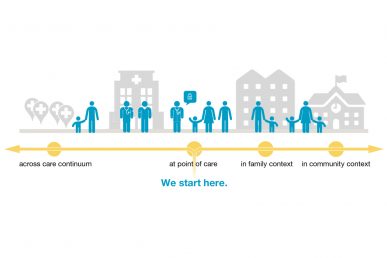New institute aims to put designers at the table for health care decision-making
The new Institute for Healthcare Delivery Design at the University of Illinois at Chicago has a unique mission: to transform the health care system into one that is intentionally and expertly designed with people — patients, families and clinicians — at the center.
“We need to make a system that fits people, rather than continue to expect people to fit into an arguably broken system,” said Kim Erwin, co-director of the institute.
Erwin, a designer, works with institute co-directors Hugh Musick, a business development strategist, and Dr. Jerry Krishnan, a pulmonologist and population health sciences researcher, to lead the institute.
“Designers have an expertise that has been underrepresented in health care decision-making, which today is laser-focused on cost, quality and efficiency. In those decisions, it’s equally important to make sure that care is organized around the people it is intended to serve,” said Erwin, who is also associate director of the Population Health Sciences program and research professor at the UIC School of Design. “These are not incompatible goals, but they require new thinking and new approaches. We want to introduce this perspective at the leadership table when initiatives are considered, implemented and evaluated.”
Erwin says that institute designers combine human factors concepts with social science perspectives, and so designers are trained to think differently. These designers also are experienced working in multidisciplinary teams and come together with those who have care or operations experience to address issues.
“We complement the deep expertise of medicine and other disciplines, and bridge that expertise to fit real-world settings,” Erwin said.
Designers are also skilled at prototyping and testing solutions with stakeholders, ensuring their fit and feasibility with the people who will be asked to use them, she said, noting that other industries have embraced these concepts and used them to produce solutions that customers value and for which they will pay.
“The vision of the institute is to use these methods from human-centered design to design supports and services that fit the everyday lives of those who provide and receive health care,” Erwin said. “This will require designing supports and services that help translate evidence into practice in clinical and community settings. We want to help raise the floor in health care, including populations at risk for health inequities.”
“Health care systems are being asked to help people lead healthy lives and not just care for them when they’re ill,” said Musick, who is also associate director of the Population Health Sciences Program. “Understanding health care in the context of daily life is no longer a ‘good to know,’ but increasingly for health care system leaders, ‘a need to know.’ The Institute for Healthcare Delivery Design seeks to address and meet head on this growing demand.”
Krishnan believes the institute is poised to be a change agent in health care.
“The health care sector is undergoing a major transformation due to shifts away from fee-for-service to value-based models of care that link payments to patient experience, quality of care and health outcomes,” said Krishnan, who is also associate vice chancellor for population health sciences and professor of medicine at UIC. “Health care delivery systems are facing enormous organizational and economic challenges during this transformation. The Institute for Healthcare Delivery Design will use human-centered design methods to assist UI Health and other delivery systems during the transformation to value-based models of care. We appreciate the support of the university and its hospital and health sciences leadership to advance the vision of the institute. “
Some of the goals of the new institute include supporting and participating in federally funded research, which notably includes helping researchers design participant recruitment and retention strategies; educating students and health care leaders about human-centered design within a health care context; and partnering with health systems, organizations, governments, civic groups and others on operations projects and public health programs.
Erwin says the institute already has been involved in research projects with more than 50 institutions, in addition to the projects it has led at UIC. Additionally, members of the institute will also be offering a special topics course through UIC’s School of Public Health beginning this fall.
Formally established by the Illinois Board of Higher Education in November, the Institute for Healthcare Delivery Design will host an open house from 4-6 p.m. April 23 at UI Health Mile Square Health Center, 1220 S. Wood St. The event will include special guest speakers Barbara Barry, design strategist at the Mayo Clinic Center for Innovation, and Stacey Chang, executive director and founder of the Design Institute for Health at the University of Texas at Austin.
More information about the institute is available online.

